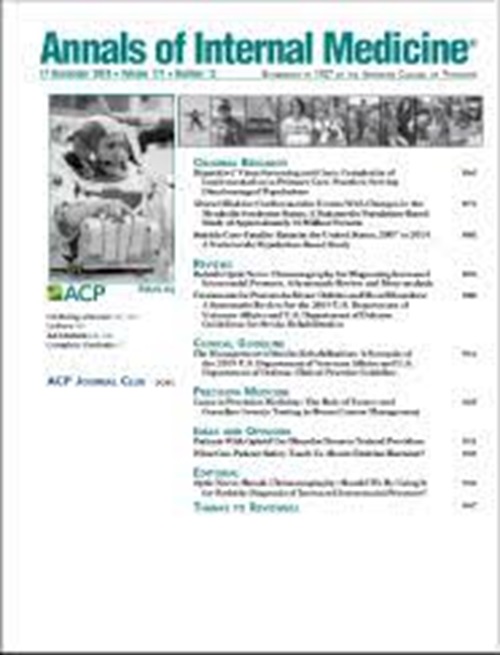更年期泌尿生殖系统综合征的荷尔蒙疗法和阴道保湿剂:系统综述。
IF 19.6
1区 医学
Q1 MEDICINE, GENERAL & INTERNAL
引用次数: 0
摘要
背景绝经后妇女通常会出现与绝经期泌尿生殖系统综合征(GSM)相关的外阴阴道、泌尿和性症状。目的评估阴道雌激素、非雌激素激素疗法和阴道保湿剂治疗 GSM 症状的有效性和危害性。研究筛选至少为期 8 周的随机对照试验 (RCT),这些试验纳入了至少有一种 GSM 症状的绝经后女性,并报告了激素干预或阴道保湿剂的有效性或危害性。数据分析从 11 993 篇引文中确定了 46 项 RCT,这些 RCT 评估了阴道雌激素(k = 22)、非雌激素激素(k = 16)、阴道保湿剂(k = 4)或多种干预措施(k = 4)。由于人群、干预措施、比较对象和结果存在差异,因此无法进行荟萃分析。与安慰剂或无治疗相比,阴道雌激素可改善外阴阴道干涩、排便困难、最令人烦恼的症状以及治疗满意度。与安慰剂相比,阴道用脱氢表雄酮(DHEA)可改善干涩、排便困难以及泌尿生殖系统症状带来的痛苦、困扰或干扰;口服奥司匹芬可改善干涩、排便困难和治疗满意度;阴道保湿剂可改善干涩(所有COE均较低)。阴道睾酮、全身性 DHEA、阴道催产素以及口服雷洛昔芬或巴唑昔芬可能无益(低 COE)或效果不确定(极低 COE)。大多数研究的持续时间为 12 周或更短,并使用了不同的 GSM 诊断标准和结果测量方法。结论阴道雌激素、阴道 DHEA、口服奥司匹芬和阴道保湿剂可在短期内改善某些 GSM 症状。有关 GSM 治疗的疗效、比较效果、耐受性和安全性的长期数据很少。(PROCEMO:CRD42023400684)。本文章由计算机程序翻译,如有差异,请以英文原文为准。
Hormonal Treatments and Vaginal Moisturizers for Genitourinary Syndrome of Menopause : A Systematic Review.
BACKGROUND
Postmenopausal women commonly experience vulvovaginal, urinary, and sexual symptoms associated with genitourinary syndrome of menopause (GSM).
PURPOSE
To evaluate effectiveness and harms of vaginal estrogen, nonestrogen hormone therapies, and vaginal moisturizers for treatment of GSM symptoms.
DATA SOURCES
Medline, Embase, and CINAHL through 11 December 2023.
STUDY SELECTION
Randomized controlled trials (RCTs) of at least 8 weeks' duration enrolling postmenopausal women with at least 1 GSM symptom and reporting effectiveness or harms of hormonal interventions or vaginal moisturizers.
DATA EXTRACTION
Risk of bias and data extraction were performed by one reviewer and verified by a second reviewer. Certainty of evidence (COE) was assessed by one reviewer and verified by consensus.
DATA SYNTHESIS
From 11 993 citations, 46 RCTs evaluating vaginal estrogen (k = 22), nonestrogen hormones (k = 16), vaginal moisturizers (k = 4), or multiple interventions (k = 4) were identified. Variation in populations, interventions, comparators, and outcomes precluded meta-analysis. Compared with placebo or no treatment, vaginal estrogen may improve vulvovaginal dryness, dyspareunia, most bothersome symptom, and treatment satisfaction. Compared with placebo, vaginal dehydroepiandrosterone (DHEA) may improve dryness, dyspareunia, and distress, bother, or interference from genitourinary symptoms; oral ospemifene may improve dryness, dyspareunia, and treatment satisfaction; and vaginal moisturizers may improve dryness (all low COE). Vaginal testosterone, systemic DHEA, vaginal oxytocin, and oral raloxifene or bazedoxifene may provide no benefit (low COE) or had uncertain effects (very low COE). Although studies did not report frequent serious harms, reporting was limited by short-duration studies that were insufficiently powered to evaluate infrequent serious harms.
LIMITATIONS
Most studies were 12 weeks or less in duration and used heterogeneous GSM diagnostic criteria and outcome measures. Few studies enrolled women with a history of cancer.
CONCLUSION
Vaginal estrogen, vaginal DHEA, oral ospemifene, and vaginal moisturizers may improve some GSM symptoms in the short term. Few long-term data exist on efficacy, comparative effectiveness, tolerability, and safety of GSM treatments.
PRIMARY FUNDING SOURCE
Agency for Healthcare Research and Quality and Patient-Centered Outcomes Research Institute. (PROSPERO: CRD42023400684).
求助全文
通过发布文献求助,成功后即可免费获取论文全文。
去求助
来源期刊

Annals of Internal Medicine
医学-医学:内科
CiteScore
23.90
自引率
1.80%
发文量
1136
审稿时长
3-8 weeks
期刊介绍:
Established in 1927 by the American College of Physicians (ACP), Annals of Internal Medicine is the premier internal medicine journal. Annals of Internal Medicine’s mission is to promote excellence in medicine, enable physicians and other health care professionals to be well informed members of the medical community and society, advance standards in the conduct and reporting of medical research, and contribute to improving the health of people worldwide. To achieve this mission, the journal publishes a wide variety of original research, review articles, practice guidelines, and commentary relevant to clinical practice, health care delivery, public health, health care policy, medical education, ethics, and research methodology. In addition, the journal publishes personal narratives that convey the feeling and the art of medicine.
 求助内容:
求助内容: 应助结果提醒方式:
应助结果提醒方式:


